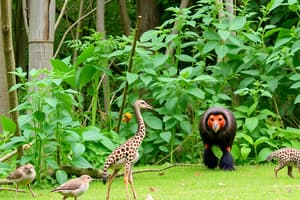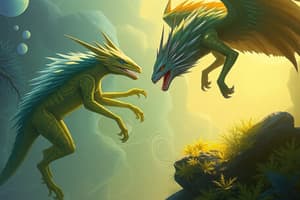Podcast
Questions and Answers
A relationship between two species where one benefits while the other is harmed.
A relationship between two species where one benefits while the other is harmed.
- Naturalism
- Mutualism
- Parasitism (correct)
- Commensalism
A frog eats a fly. The frog and fly are demonstrating _____.
A frog eats a fly. The frog and fly are demonstrating _____.
- mutualism
- predator/prey (correct)
- parasitism
- competition
A relationship between two organisms in which one organism benefits and the other is unharmed.
A relationship between two organisms in which one organism benefits and the other is unharmed.
- Parasitism
- Competition
- Commensalism (correct)
- Mutualism
The crocodile and bird have a ____ relationship. The crocodile benefits by having its teeth cleaned. The bird benefits by gaining food and protection. Both animals benefit from this relationship.
The crocodile and bird have a ____ relationship. The crocodile benefits by having its teeth cleaned. The bird benefits by gaining food and protection. Both animals benefit from this relationship.
What type of species interaction is the following: two bears fighting over the same mate.
What type of species interaction is the following: two bears fighting over the same mate.
Name the species interaction: A decorator crab camouflages itself with sponges. Sponges are unaffected.
Name the species interaction: A decorator crab camouflages itself with sponges. Sponges are unaffected.
Evidence shows that some grasses benefit from being grazed. Which of the following terms would best describe this plant-herbivore interaction?
Evidence shows that some grasses benefit from being grazed. Which of the following terms would best describe this plant-herbivore interaction?
They can live in many different places, eat a variety of foods, and tolerate a wide range of environmental conditions.
They can live in many different places, eat a variety of foods, and tolerate a wide range of environmental conditions.
They may be able to live in only one type of habitat, tolerate only a narrow range of climatic and other environmental conditions, or use only one type or a few types of food.
They may be able to live in only one type of habitat, tolerate only a narrow range of climatic and other environmental conditions, or use only one type or a few types of food.
In which type of interaction does one animal eat another for energy and nutrients?
In which type of interaction does one animal eat another for energy and nutrients?
In Madagascar, several species of lemur eat bamboo, but each species specializes in one part of the bamboo-one species eats mature bamboo stalks, one species eats bamboo shoots, and one species eats leaves. This is an example of _____.
In Madagascar, several species of lemur eat bamboo, but each species specializes in one part of the bamboo-one species eats mature bamboo stalks, one species eats bamboo shoots, and one species eats leaves. This is an example of _____.
In the western United States, at the southern edge of their range, moose are sometimes so severely infested with ticks that they die. The tick/moose relationship is best described as _____.
In the western United States, at the southern edge of their range, moose are sometimes so severely infested with ticks that they die. The tick/moose relationship is best described as _____.
A beehive depends on pollen from flowers to survive. Flowers depend on bees to pollinate them. Humans tend bee hives, offering the bees a place to live in exchange for some of their honey. The relationship among these three sets of organisms is _____.
A beehive depends on pollen from flowers to survive. Flowers depend on bees to pollinate them. Humans tend bee hives, offering the bees a place to live in exchange for some of their honey. The relationship among these three sets of organisms is _____.
Animals gathering around a water hole in a drought-prone area and establishing hierarchies of access to the water is an example of competition.
Animals gathering around a water hole in a drought-prone area and establishing hierarchies of access to the water is an example of competition.
You have many species of bacteria living in your gut that help you with digestion. This relationship is best defined as commensalism.
You have many species of bacteria living in your gut that help you with digestion. This relationship is best defined as commensalism.
A tapeworm lives inside of a host's body. This means that tapeworms are _____.
A tapeworm lives inside of a host's body. This means that tapeworms are _____.
Attach or burrow into the skin and include ticks, fleas, and lice.
Attach or burrow into the skin and include ticks, fleas, and lice.
What is a primary advantage of generalist species compared to specialist species?
What is a primary advantage of generalist species compared to specialist species?
Which scenario illustrates the vulnerability of specialist species?
Which scenario illustrates the vulnerability of specialist species?
What effect does environmental disturbance have on specialist species?
What effect does environmental disturbance have on specialist species?
How do invasive species typically relate to resource adaptability?
How do invasive species typically relate to resource adaptability?
Why are conservation efforts often focused on specialist species?
Why are conservation efforts often focused on specialist species?
What is one advantage of generalists in varying environments?
What is one advantage of generalists in varying environments?
How do specialists typically exploit resources compared to generalists?
How do specialists typically exploit resources compared to generalists?
Which of the following is a characteristic benefit of generalists?
Which of the following is a characteristic benefit of generalists?
What do specialists gain from their specific adaptations?
What do specialists gain from their specific adaptations?
Why might generalists be more resilient to environmental disturbances?
Why might generalists be more resilient to environmental disturbances?
What is a notable example of a generalist species adapting to urban environments?
What is a notable example of a generalist species adapting to urban environments?
What advantage do specialists have in environments rich with their preferred resources?
What advantage do specialists have in environments rich with their preferred resources?
What limitation do specialists face compared to generalists?
What limitation do specialists face compared to generalists?
Flashcards
Parasitism
Parasitism
A relationship where one organism benefits and the other is harmed.
Predator/Prey
Predator/Prey
A relationship where one organism hunts and eats another for energy.
Commensalism
Commensalism
A relationship where one organism benefits, and the other is neither harmed nor helped.
Mutualism
Mutualism
Signup and view all the flashcards
Competitive Exclusion Principle
Competitive Exclusion Principle
Signup and view all the flashcards
Competition
Competition
Signup and view all the flashcards
Symbiosis
Symbiosis
Signup and view all the flashcards
Resource Partitioning
Resource Partitioning
Signup and view all the flashcards
Generalist Species
Generalist Species
Signup and view all the flashcards
Specialist Species
Specialist Species
Signup and view all the flashcards
Predation
Predation
Signup and view all the flashcards
Character Displacement
Character Displacement
Signup and view all the flashcards
Endoparasite
Endoparasite
Signup and view all the flashcards
Ectoparasite
Ectoparasite
Signup and view all the flashcards
Generalist Species
Generalist Species
Signup and view all the flashcards
Specialist Species
Specialist Species
Signup and view all the flashcards
Generalist Advantage
Generalist Advantage
Signup and view all the flashcards
Specialist Advantage
Specialist Advantage
Signup and view all the flashcards
Generalist Example
Generalist Example
Signup and view all the flashcards
Specialist Example
Specialist Example
Signup and view all the flashcards
Adaptability to changing environments
Adaptability to changing environments
Signup and view all the flashcards
Specialist species
Specialist species
Signup and view all the flashcards
Generalist species
Generalist species
Signup and view all the flashcards
Specialized diets
Specialized diets
Signup and view all the flashcards
Vulnerability of specialists
Vulnerability of specialists
Signup and view all the flashcards
Invasive species & generalism
Invasive species & generalism
Signup and view all the flashcards
Specialist species & conservation
Specialist species & conservation
Signup and view all the flashcards
Study Notes
Community Interactions Review
- Relationship harming one species: A relationship where one species benefits, and the other is harmed, is called parasitism.
- Predator-prey relationship: A frog eating a fly is an example of a predator-prey relationship.
- Relationship benefiting both species: A relationship where both species benefit is called mutualism. An example is the crocodile and bird, where the bird cleans the crocodile's teeth and the bird gets food and protection.
- Relationship benefiting one, other unharmed: A relationship where one species benefits, and the other is not harmed or benefited, is called commensalism. For example, a decorator crab camouflaging itself with sponges, with the sponges unaffected is an example of commensalism.
- Competition for resources: When two species compete for the same resources, one can eventually go extinct.
- Resource partitioning: When two species divide a resource based on behavioral or physical differences is resource partitioning. Examples of resource partitioning include different species of lemur eating different parts of bamboo.
- Species occupying the same niche: No two species can occupy the same niche.
- Specialists vs Generalists: Specialist species have a narrow range of food, habitat, and other environmental conditions versus generalist species that can eat a variety of food and survive in different environments.
- Predation is eating energy: Predation is when one animals eats another for energy.
- Symbiosis: A close relationship between two organisms is called symbiosis.
- Parasitism: Parasitism is when one species benefits from another species that is harmed. Tapeworms in a host are an example of parasitism.
- Endoparasites: Parasites that live inside a host's body.
- Ectoparasites: Parasites that live outside a host's body.
- Mutualism: When both organisms benefit.
- Competition: Two or more organisms trying to use the same resources
- Competitive exclusion: If two species try to occupy the same niche, one might go extinct.
- Character displacement: One species evolves physical characteristics to reduce competition.
- Symbiotic relationship: A close interaction between two organisms is symbiotic.
- Food web: Multiple species interacting in a close relationship.
Studying That Suits You
Use AI to generate personalized quizzes and flashcards to suit your learning preferences.




